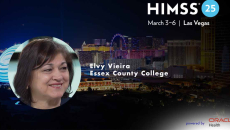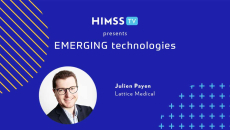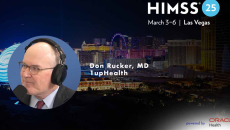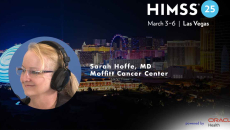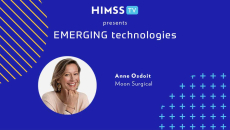HIMSS TV
HIMSS25
Essex County College's Elvy Vieira says the college is increasing access to health technology jobs by offering a data science degree and credentialing courses, as well as a dual enrollment program for high schoolers.
HIMSS25
AI tools can personalize patients' searches for providers, but Kyruus Health's Gen Conlin believes nurse informaticists' ability to ensure tool accessibility and accuracy are vital to ensuring patients find the right care.
HIMSS25
Joan Webley of Hospitals Without Borders, which provides modular hospitals and clinics to regions in need, says attending HIMSS25 helped her gain insights and connect with people interested in the organization's mission.
Julien Payen, cofounder and CEO of Lattice Medical, discusses the company’s 3D-printed breast implant that supports women recovering from mastectomy using a scaffold that gradually dissolves as the patient’s own tissue regenerates.
Eversana senior vice president of health innovation, Alberta Spreafico, discusses the company's collaboration with the Digital Therapeutics Alliance to analyze frameworks and map reimbursement pathways in Europe for digital health adoption.
HIMSS25
With healthcare spending, particularly for Medicare Advantage, under scrutiny, 1upHealth's Dr. Don Rucker says AI-ready, open API platforms that can integrate and analyze disparate data are needed to inform care and control costs.
HIMSS25
Dr. Sarah Hoffe, interim GI oncology chair at Moffitt Cancer Center, says telemedicine platforms and other technologies help ease nurse burnout, boost patient adherence and enable focused, personalized patient connections.
In response to a new price cap law in Indiana, Hal Andrews, CEO of Trilliant Health, says once a state legislature is allowed to determine maximum reimbursement, hospitals are subject to that being changed any time the legislature gets together.
HIMSS25
Edward Marx, CEO of Marx Advisory, recommends that healthcare leaders looking to drive innovation in their organizations become innovative themselves by bringing their C-suite to meet with and learn from partners.
Anne Osdoit, CEO of Moon Surgical, says the company’s robotic surgery offering serves as a surgical assistant in laparoscopic soft tissue procedures, using robotic arms to hold instruments and AI to give insights into workflow efficiency.
